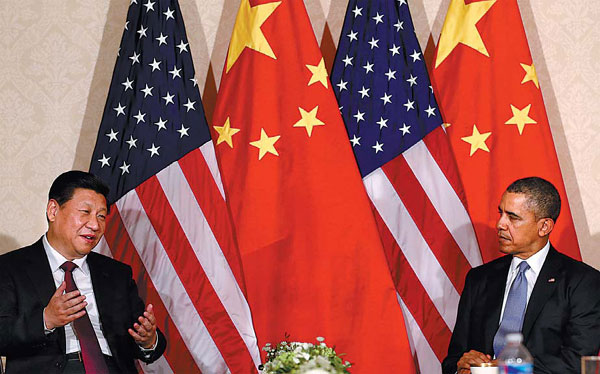China needs coordinative public diplomacy
Updated: 2015-07-28 09:37
By Wang Lili(China Daily )
|
||||||||
 |
|
Chinese President Xi Jinping, left, meets with his US counterpart Barack Obama on the sidelines of the Nuclear Security Summit in The Hague on March 24, 2014. [Photo/Agencies] |
President Xi Jinping's scheduled visit to the United States in September is likely to create new opportunities for not only consolidating the "new type of major-power relationship" between Beijing and Washington, but also China's public diplomacy vis-a-vis the US. The two countries' cooperation on the economic front, and to maintain the world order and meet the global challenges is deepening with the increase in China's comprehensive national power.
The US and China now have dozens of dialogue and negotiation mechanisms to settle bilateral differences and problems. But some US think tanks' and media outlets' biased opinions about China, because of their anxiety over China's rise, cannot be changed through intergovernmental dialogue. For that to happen, therefore, China's public diplomacy has to play its due role; it has to help US think tanks and media outlets understand China's national conditions, principles, strategic intentions and development concept.
But since China does not have a unified mechanism to use its public diplomacy, it needs to make it more consistent, continuous and coordinative, as its non-governmental diplomatic channels, despite growing in influence, are still not that influential.
When China tries to influence public opinion in the US through public diplomacy, it cannot find corresponding social factors to do so, because of the difference in the two countries' social set-up. In contrast, the US can skillfully mobilize various channels, including new media, to improve the efficiency and diversify the models of its public diplomacy endeavors.
Most of China's public diplomacy agencies do not have in-depth and accurate knowledge of their targeted groups in the US. The communication in public diplomacy is different from the mass media communications in terms of contents, models and agenda. So, China should take measures to elevate its public diplomacy to the level of national strategy, and form a special department to administer and coordinate its public diplomacy, promote interactions between think tanks and decision-making departments.
China should also put its public diplomacy resources in the State Council Information Office, Ministry of Foreign Affairs, Ministry of Education and other departments under a unified leadership, so as to better serve the overall State security strategy. And it should set up a special public diplomacy department for the US.
Besides, Chinese think tanks, media outlets, universities, enterprises and social organizations can become more effective partners than the government in dialogues with their US counterparts, for non-governmental organizations have a unique strength when it comes to public diplomacy, and cannot be replaced by the government.
As a trans-disciplinary power, new media are an indispensable channel in modern public diplomacy, and China is home to the largest number of Internet users in the world, as well as several world-class information technology enterprises. This is to say that Beijing can use new media to build a constructive platform for communication between the people of China and the US in order to promote mutual understanding and trust.
US think tanks have great influence on decision-makers and social elites. Famous US think tanks, therefore, should be one of the most important target groups for China's public diplomacy.
Given these facts, China urgently needs to plan its public diplomacy for Xi's visit to the US, a key objective of which is to maintain the steady development of Sino-US ties. China can choose a few US think tanks to explain the purpose and importance of Xi's visit, or hold a meeting with them to present Xi's views on issues that concern them the most. Such face-to-face communication will directly influence US strategists' views on China.
Beijing can also consider organizing an interview of Xi with a mainstream US media outlet, and make good use of Chinese media outlets in the US to tell its side of the story in a reader-friendly way to American citizens.
The author is a research scholar of China in public diplomacy at Renmin University.
- Global health entering new era: WHO chief
- Brazil's planning minister steps aside after recordings revelation
- Vietnam, US adopt joint statement on advancing comprehensive partnership
- European border closures 'inhumane': UN refugee agency
- Japan's foreign minister calls A-bombings extremely regrettable
- Fukushima impact unprecedented for oceans: US expert

 Stars of Lijiang River: Elderly brothers with white beards
Stars of Lijiang River: Elderly brothers with white beards
 Wealthy Chinese children paying money to learn British manners
Wealthy Chinese children paying money to learn British manners
 Military-style wedding: Fighter jets, grooms in dashing uniforms
Military-style wedding: Fighter jets, grooms in dashing uniforms
 Striking photos around the world: May 16 - May 22
Striking photos around the world: May 16 - May 22
 Robots help elderly in nursing home in east China
Robots help elderly in nursing home in east China
 Hanging in the air: Chongqing holds rescue drill
Hanging in the air: Chongqing holds rescue drill
 2.1-ton tofu finishes in two hours in central China
2.1-ton tofu finishes in two hours in central China
 Six things you may not know about Grain Buds
Six things you may not know about Grain Buds
Most Viewed
Editor's Picks

|

|

|

|

|

|
Today's Top News
Liang avoids jail in shooting death
China's finance minister addresses ratings downgrade
Duke alumni visit Chinese Embassy
Marriott unlikely to top Anbang offer for Starwood: Observers
Chinese biopharma debuts on Nasdaq
What ends Jeb Bush's White House hopes
Investigation for Nicolas's campaign
Will US-ASEAN meeting be good for region?
US Weekly

|

|







